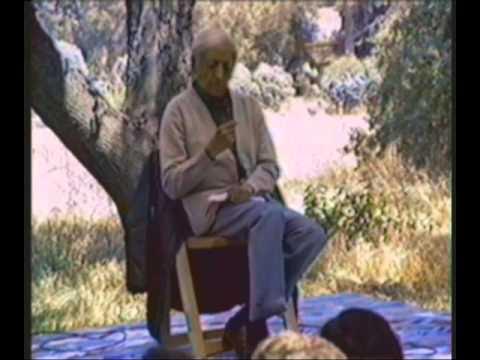Breaking Free From the Trap of Conditioned Longing
Summary
TLDRThis thought-provoking script explores the nature of loneliness, questioning whether it's a genuine emotion or a conditioned response to societal expectations. It delves into how our minds romanticize the past and the impact of social conditioning on our sense of self and belonging. The narrative challenges viewers to reconsider their fear of solitude and the pursuit of external connections, suggesting that true connection begins with introspection and self-awareness. It encourages embracing solitude as a path to creativity, freedom, and a deeper, more authentic life, ultimately arguing that the fear of loneliness is a social construct that can be overcome by reconnecting with one's inner self.
Takeaways
- 🤔 Loneliness might be a conditioned response rather than an inherent part of human existence, suggesting it's something we've been taught to feel.
- 🧠 Our brains are wired to romanticize the past and build narratives around memories, which might not always align with reality.
- 🌟 Neuroscientist Bruce Hood posits that the self is an illusion, constructed from memories and social conditioning, questioning the authenticity of feelings like loneliness.
- 📈 Loneliness is often about unmet expectations, with societal standards and media influencing our perceptions of connection and belonging.
- 🏞️ The fear of loneliness can drive behavior, relationships, and life choices, as people seek to avoid the perceived void of solitude.
- 🔄 The script challenges the idea that being alone equates to being incomplete, suggesting that solitude can be a space for creativity and introspection.
- 🔮 Loneliness can be a sign of living inauthentically, prompting individuals to seek more meaningful connections and self-understanding.
- 📱 Technology and social media can create a false sense of connection, which may exacerbate feelings of loneliness rather than alleviate them.
- 🔑 The key to overcoming loneliness may lie in embracing solitude, fostering self-connection, and recognizing that true fulfillment comes from within.
- 💡 The script encourages viewers to question societal conditioning, be present in the moment, and find peace in the reality of one's own company.
Q & A
What is the main argument presented in the video script about loneliness?
-The main argument is that loneliness is not an inherent part of human existence but rather a conditioned response, a construct of societal expectations and narratives that can be deconstructed.
How does the script suggest that our brains contribute to the feeling of loneliness?
-The script suggests that our brains are wired to romanticize the past and build stories that tie us to certain memories, leading us to long for something that may not have been as fulfilling as we remember, thus contributing to feelings of loneliness.
What role does social media play in the perception of loneliness according to the script?
-Social media is portrayed as a tool that amplifies the conditioned response to loneliness by bombarding users with images of connection and togetherness, creating a narrative that everyone else is living their best life, which can intensify feelings of loneliness.
Why does the script argue that the fear of loneliness can drive certain life choices?
-The script argues that the fear of loneliness can drive life choices because people are conditioned to see being alone as being incomplete, leading them to seek external validation and connections to avoid the perceived void of loneliness.
What does the script suggest as a solution to breaking free from the conditioned response of loneliness?
-The script suggests questioning the societal conditioning that leads to loneliness, embracing solitude, and connecting with oneself as solutions to breaking free from the conditioned response.
How does the script differentiate between being alone and being lonely?
-The script differentiates by stating that being alone is a physical state, whereas being lonely is a psychological state often driven by societal conditioning and the fear of not meeting expectations of connection.
What does the script propose as the ultimate source of connection that people often overlook?
-The script proposes that the ultimate source of connection that people often overlook is the connection with oneself, which is more profound and meaningful than external validation or superficial connections.
How does the script relate the concept of loneliness to the idea of living inauthentically?
-The script relates loneliness to living inauthentically by suggesting that the feeling of loneliness might be a sign that one is not living in alignment with their true self, values, or desires, and that embracing solitude can lead to a more authentic way of living.
What is the script's perspective on the role of technology in the experience of loneliness?
-The script views technology as a double-edged sword, where it can provide a false sense of connection through digital interactions, which can ultimately amplify loneliness rather than alleviate it, as they lack the depth and authenticity of real human connections.
How does the script encourage viewers to reframe their understanding of loneliness?
-The script encourages viewers to reframe their understanding of loneliness by recognizing it as a conditioned response that can be deconstructed, and by embracing solitude and self-connection as pathways to freedom from the fear of loneliness.
Outlines

This section is available to paid users only. Please upgrade to access this part.
Upgrade NowMindmap

This section is available to paid users only. Please upgrade to access this part.
Upgrade NowKeywords

This section is available to paid users only. Please upgrade to access this part.
Upgrade NowHighlights

This section is available to paid users only. Please upgrade to access this part.
Upgrade NowTranscripts

This section is available to paid users only. Please upgrade to access this part.
Upgrade NowBrowse More Related Video

Unborn Babies Are Children, Not a Choice | Short Clips

The Rise of Far-Right Populism| Bigger Than Five

The Lie We Live

Você Viveria Sua Vida Repetidas Vezes? | Eterno Retorno de Nietzsche

U.G. Krishnamurti - No Free Will & No Thoughts of Your Own

For the making of images to end, must thought also end? | J. Krishnamurti
5.0 / 5 (0 votes)